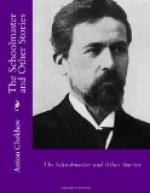“What is Alphonse Ludovikovitch doing?” he asks the footman.
“He is packing his trunk, sir.”
“What a noodle! Lord forgive us!” says Kamyshev, and goes in to the Frenchman.
Champoun is sitting on the floor in his room, and with trembling hands is packing in his trunk his linen, scent bottles, prayer-books, braces, ties. . . . All his correct figure, his trunk, his bedstead and the table—all have an air of elegance and effeminacy. Great tears are dropping from his big blue eyes into the trunk.
“Where are you off to?” asks Kamyshev, after standing still for a little.
The Frenchman says nothing.
“Do you want to go away?” Kamyshev goes on. “Well, you know, but . . . I won’t venture to detain you. But what is queer is, how are you going to travel without a passport? I wonder! You know I have lost your passport. I thrust it in somewhere between some papers, and it is lost. . . . And they are strict about passports among us. Before you have gone three or four miles they pounce upon you.”
Champoun raises his head and looks mistrustfully at Kamyshev.
“Yes. . . . You will see! They will see from your face you haven’t a passport, and ask at once: Who is that? Alphonse Champoun. We know that Alphonse Champoun. Wouldn’t you like to go under police escort somewhere nearer home!”
“Are you joking?”
“What motive have I for joking? Why should I? Only mind now; it’s a compact, don’t you begin whining then and writing letters. I won’t stir a finger when they lead you by in fetters!”
Champoun jumps up and, pale and wide-eyed, begins pacing up and down the room.
“What are you doing to me?” he says in despair, clutching at his head. “My God! accursed be that hour when the fatal thought of leaving my country entered my head! . . .”
“Come, come, come . . . I was joking!” says Kamyshev in a lower tone. “Queer fish he is; he doesn’t understand a joke. One can’t say a word!”
“My dear friend!” shrieks Champoun, reassured by Kamyshev’s tone. “I swear I am devoted to Russia, to you and your children. . . . To leave you is as bitter to me as death itself! But every word you utter stabs me to the heart!”
“Ah, you queer fish! If I do abuse the French, what reason have you to take offence? You are a queer fish really! You should follow the example of Lazar Isaakitch, my tenant. I call him one thing and another, a Jew, and a scurvy rascal, and I make a pig’s ear out of my coat tail, and catch him by his Jewish curls. He doesn’t take offence.”
“But he is a slave! For a kopeck he is ready to put up with any insult!”
“Come, come, come . . . that’s enough! Peace and concord!”
Champoun powders his tear-stained face and goes with Kamyshev to the dining-room. The first course is eaten in silence, after the second the same performance begins over again, and so Champoun’s sufferings have no end.




